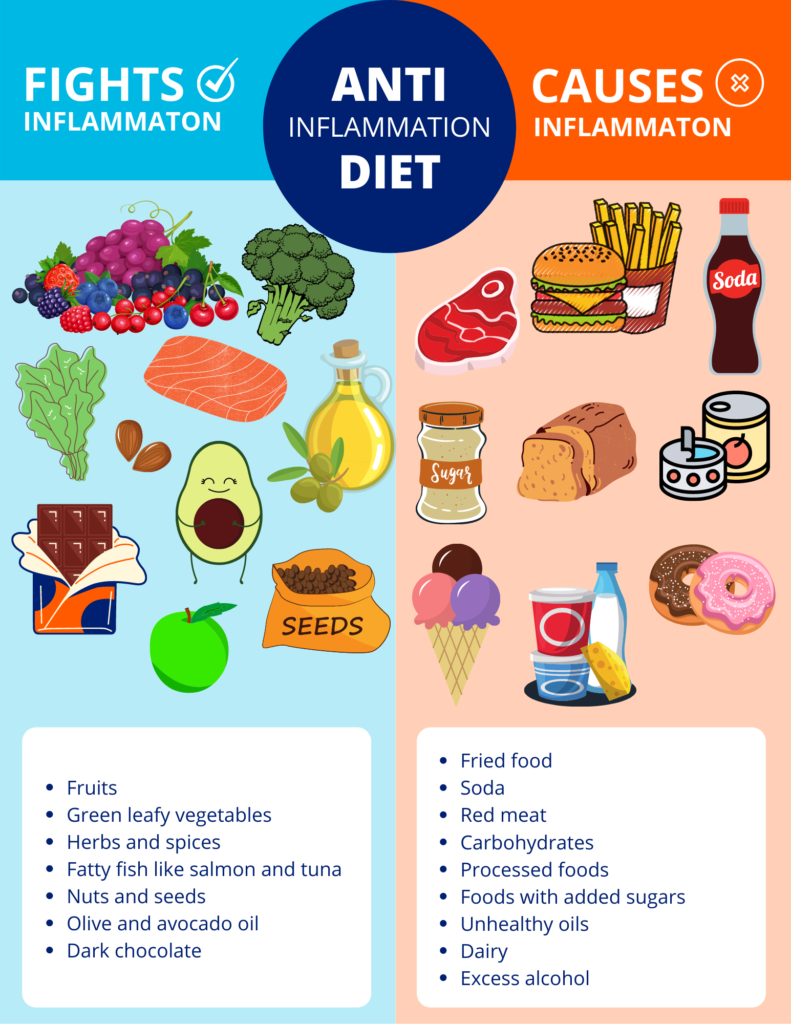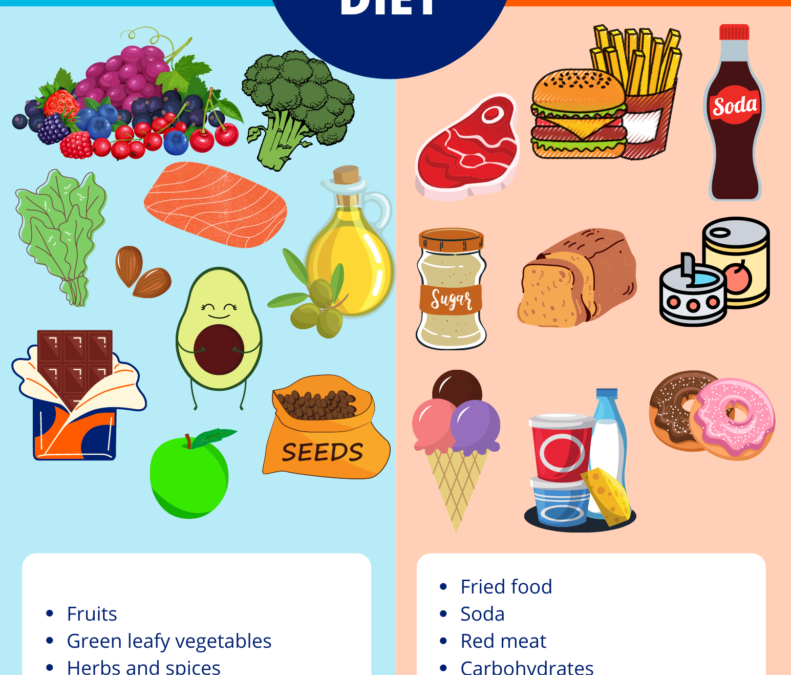As athletes, achieving peak performance on the track requires more than just rigorous training and mental preparation. Nutrition plays a crucial role in how well we perform, especially in the days leading up to a track meet. Consuming inflammatory foods can negatively impact your performance by causing fatigue, sluggishness, and even joint pain. In this article, we’ll identify inflammatory foods that should be avoided and suggest healthier alternatives to ensure you’re at your best on race day.
What Are Inflammatory Foods?
Inflammatory foods are those that can cause inflammation in the body, which is the immune system’s response to injury or harmful substances. Chronic inflammation can lead to various health issues, including decreased athletic performance, slower recovery times, and increased risk of injury.
Inflammatory Foods to Avoid
- Processed Sugars and Sweets
- Examples: Candy, pastries, sugary cereals, sodas, and sweetened beverages.
- Why Avoid?: High sugar intake can lead to a spike in blood sugar levels followed by a crash, causing fatigue and impaired performance. It also promotes inflammation and can weaken the immune system.
- Refined Carbohydrates
- Examples: White bread, white rice, pasta, and baked goods made with white flour.
- Why Avoid?: These foods have a high glycemic index, leading to rapid spikes in blood sugar and insulin levels, which can promote inflammation and decrease energy levels.
- Fried and Fast Foods
- Examples: French fries, fried chicken, burgers, and other deep-fried items.
- Why Avoid?: These foods are high in trans fats and unhealthy oils, which can cause inflammation and negatively affect cardiovascular health and athletic performance.
- Processed Meats
- Examples: Sausages, hot dogs, bacon, and deli meats.
- Why Avoid?: Processed meats contain high levels of saturated fats and preservatives like nitrates, which are linked to increased inflammation and a higher risk of chronic diseases.
- Artificial Trans Fats
- Examples: Margarine, shortening, and foods containing partially hydrogenated oils.
- Why Avoid?: Trans fats are notorious for causing inflammation and increasing the risk of heart disease, making them detrimental to athletic performance.
- High-Sodium Foods
- Examples: Canned soups, chips, salted nuts, and processed snacks.
- Why Avoid?: Excessive sodium can lead to water retention and high blood pressure, which can negatively impact cardiovascular performance and endurance.
- Dairy Products
- Examples: Whole milk, cheese, ice cream, and butter.
- Why Avoid?: Some individuals may have a sensitivity to dairy, which can cause digestive issues and inflammation.
Healthy Alternatives to Boost Performance
- Whole Grains
- Examples: Brown rice, quinoa, oats, and whole grain bread.
- Benefits: These provide sustained energy, fiber, and essential nutrients without causing rapid spikes in blood sugar.
- Lean Proteins
- Examples: Chicken breast, turkey, fish, tofu, and legumes.
- Benefits: Lean proteins help repair and build muscle tissues, essential for recovery and performance.
- Healthy Fats
- Examples: Avocados, nuts, seeds, and olive oil.
- Benefits: Healthy fats provide long-lasting energy, reduce inflammation, and support overall health.
- Fresh Fruits and Vegetables
- Examples: Berries, oranges, spinach, kale, and broccoli.
- Benefits: Rich in antioxidants, vitamins, and minerals, fresh produce helps reduce inflammation and supports immune function.
- Hydrating Foods and Fluids
- Examples: Watermelon, cucumbers, coconut water, and herbal teas.
- Benefits: Staying hydrated is crucial for optimal performance, and these foods and drinks help maintain fluid balance and electrolyte levels.
- Anti-Inflammatory Spices
- Examples: Turmeric, ginger, garlic, and cinnamon.
- Benefits: These spices have natural anti-inflammatory properties and can be easily incorporated into meals to enhance flavor and health benefits.
Sample Meal Plan for Pre-Track Meet Preparation
Breakfast
- Overnight oats with chia seeds, topped with fresh berries and a drizzle of honey.
- Green smoothie made with spinach, banana, almond milk, and a scoop of protein powder.
Lunch
- Quinoa salad with mixed greens, cherry tomatoes, cucumbers, chickpeas, and a lemon-tahini dressing.
- Grilled chicken breast or tofu on the side.
Snack
- Apple slices with almond butter.
- A handful of mixed nuts and seeds.
Dinner
- Baked salmon with a side of roasted sweet potatoes and steamed broccoli.
- A mixed green salad with avocado, cherry tomatoes, and a vinaigrette dressing.
Hydration
- Drink plenty of water throughout the day.
- Include coconut water or herbal teas for added hydration and electrolytes.
Conclusion
Avoiding inflammatory foods and opting for healthier alternatives in the days leading up to a track meet can significantly enhance your performance and recovery. By choosing whole grains, lean proteins, healthy fats, and fresh produce, you’ll provide your body with the necessary nutrients to perform at its best. Incorporate these dietary changes into your routine and watch your performance on the track reach new heights!

References:
- Hu, F. B., & Willett, W. C. (2002). Optimal diets for prevention of coronary heart disease. JAMA, 288(20), 2569-2578.
- Pan, A., Sun, Q., Bernstein, A. M., Schulze, M. B., Manson, J. E., Willett, W. C., & Hu, F. B. (2012). Red meat consumption and mortality: results from 2 prospective cohort studies. Archives of Internal Medicine, 172(7), 555-563.
- Mozaffarian, D., Katan, M. B., Ascherio, A., Stampfer, M. J., & Willett, W. C. (2006). Trans fatty acids and cardiovascular disease. New England Journal of Medicine, 354(15), 1601-1613.
- Calder, P. C. (2006). n−3 polyunsaturated fatty acids, inflammation, and inflammatory diseases. American Journal of Clinical Nutrition, 83(6), 1505S-1519S.
- Li, Y., Liu, S., Zhang, Y., & Lin, J. (2014). Dietary inflammatory index and the risk of colorectal cancer: a meta-analysis. Nutrients, 6(10), 4186-4198.
Happy training and good luck at your next track meet!

